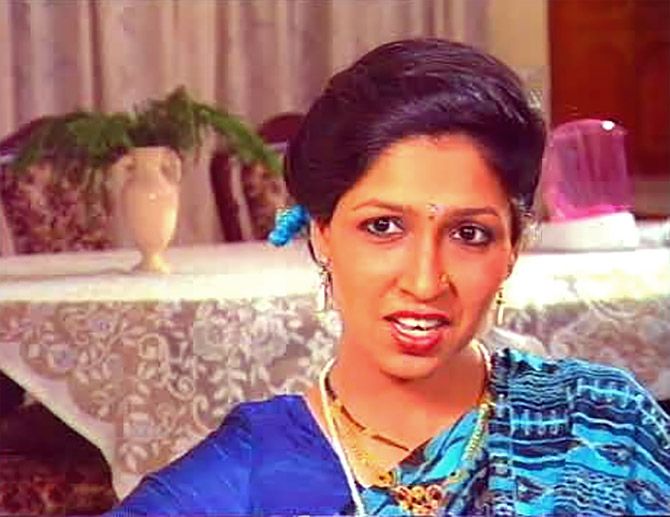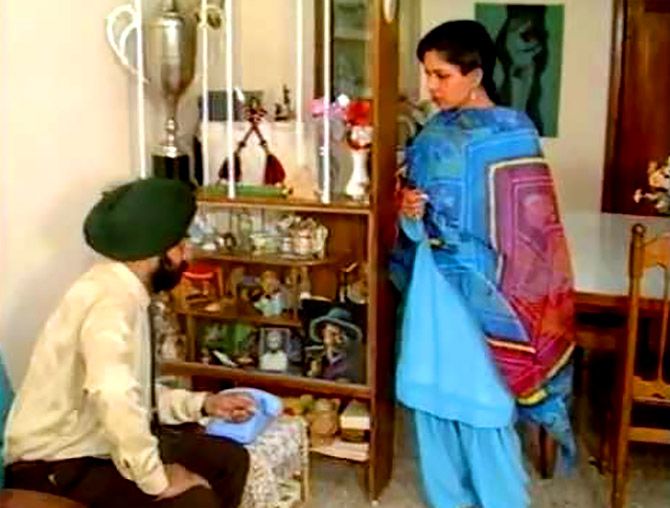Jaspal Bhatti's feel for the grime, the confusions, and the madness in our system was so complete that he could take on every kind of woman or man God ever gave to the institutions of India, remembers Sreehari Nair.

The episodes are like short Kafka stories told by Groucho Marx.
When his tetchy wife informs Jaspal Bhatti that the cops are about to raid their house to check if they have their neighbour's money -- a crime that hasn't been committed -- our man jumps into action.
'Think I should borrow a few hundred rupee notes and keep them in the house. It would be a disgrace if the cops come raiding and find out that we are penniless,' he says.
Mrs Bhatti agrees.
Her husband's is indeed the logical course of action.
Revisiting Flop Show after all these years, I had the most curious sense of excitement.
My peculiar frame of attention seemed to spring from the realisation that I wasn't watching a mere satire of tinpot bureaucracies, but the birthing of a whole new style of Hindi comedy.
Sure he is being funny when he shouldn't be (human deaths are sloughed over; while the death of a dog and that of a telephone get their share of mourning), Bhatti also scores his laughs through showing us the self-seriousness in trivial pursuits.
An office meeting to prepare a team for a future meeting lapses into a discussion about where the samosas must be placed, and where the gulab jamuns should go.
A stenographer tries to rein in the situation by mentioning the word 'agenda' and Bhatti shouts her down, 'Agenda can be discussed later too. But the samosas, mind it, must come out perfectly fried.'

Flop Show, then, isn't so much an attack on our bureaucracies as it is a celebration of their poetic insanities, of their essential mysteries.
One episode has Bhatti's character summoning the memory of a golden past, thus: 'It's a pity that corruption has gone down so much.'
You'll be tempted to classify such subversive strokes, not to mention the burlesque opening number and the parody at the end of each episode, as glorious examples of self-deprecation.
There's more courage, however, in this groundbreaking 10-part series than the term (self-deprecation) suggests.
A courage that becomes all the more evident now, three decades since it first hit prime time.
In creating a television show whose only aim was to be immediately ingratiating, whose only mission was to laugh in the face of megalomania, wrongdoings and doom, Jaspal Bhatti had, in the Nation of the Earnest, dared to be Vulgar -- Vulgar in the best sense of the word.
In nearly every episode, fools, confidence men, and asses too small for their chairs, bounded out from the screen as if the scripts were trampolines on which they perfected their leaps.
Bhatti's feel for the grime, the confusions, and the madness in our system was so complete that he could take on every kind of woman or man God ever gave to the institutions of India.
Self-mythologising thieves slurp and do their little pirouettes.
Babus, union leaders, fixers, middlemen, secretaries whose eyes widened every time they uttered a line or let slip a piece of gossip, and strong wives with a clear understanding of where the Red Tape ended and where the Grocery List began -- what a cornucopia of 'types' and 'figures' populate Bhatti's bureaucracies.
Yes! This is a show that loves those piles of paperwork and files, loves those petty excuses, loves an honest display of mediocrity, loves those non-ambitious faces -- its true object of ridicule being the Indian Earnestness.
And it is the commitment to Sidestepping Earnestness by every means possible that flavours the humour; that makes one want to proclaim, Hemingway-like, “All modern Hindi comedies come from Flop Show.

Think about the overstatement while I round up the apostles.
All India Bakchod's Honest Series drew its free-associating style from Flop Show's faith in the irony which emerges when characters say aloud that which they are supposed to keep locked in their heads.
Office Office absorbed the show's farcicality, but could barely digest its grit.
If only Andaz Apna Apna had, as sustained a feeling for compliments that play like veiled abuses... so goes the sigh.
In different places in their works, you can sense that Shekhar Suman had studied it, and Cyrus Broacha had dipped into its rhythms.
You can rationalise the pilfering from Flop Show by Indian Wits; but how spooky it was to hear Woody Allen, in his iconic Oscar appearance in 2002, use one of Bhatti's jokes.
When invited to be the chief guest at an event:
'You surely can do much better than me.'
'We know, sir. But, the good ones weren't available.'
Come to think of it, Bhatti performed the feat of 'crafting an episode about the crafting of the show we were watching' some four years prior to Seinfeld testing the meta waters.

But pulling back into the national context, before Jaspal Bhatti, hardly anyone had strove to make an Indian audience's awareness of the artifices in an act of comedy a part of the act, an integral part of the fun.
And so, everything from Bhatti's obviously inept acting to Vivek Shaque's clearly poor makeup (across episodes), adds to the show's attitude than derails it.
The unrealness of the reactions, the exaggerated zoom-ins and zoom-outs, the saying of the punchlines to the camera -- all this may give the show a marvelous Period Quality now but Bhatti, my guess is, wanted the sketches to hold the viewers in a state of steady disequilibrium. So he pushed to make the vulgarities more vulgar.
Here was a man whose idea of showing his viewers a good time was keeping them conscious of the mechanics that went into creating that good time./p>
And so, he gives us in Savita Bhatti, an actress, who while playing different characters, is also a wife who wants to go beyond the lines her husband wrote for her.
What an actively bickering couple we have here!
She is Nora Barnacle to his James Joyce -- forever bringing him back to earth, always reminding him, 'Professional hierarchies be damned; I am the boss of you.'
When he, still in the throes of an office problem, answers her phone in a rude tone, she catches him by his chin, almost, 'Talk properly! This is *your wife* speaking.'
He apologises to her, but comments on his domestic condition elsewhere, when discussing her 'depression' with a doctor in the following terms, 'It's a good thing that she has gone silent; as a prisoner of her constant yapping, however, I seriously hope you would bring her back.'
It must be one of the less-talked-about appeals of the modern hero: the ability to stay relaxed when your lady unloads herself on you, calls you a no-good -- all the while, searching for a moment to gracefully express the truth of your situation.
There's more juice about this ideal than the new-age theories of the new-age soft-hearts which end in proclamations like, 'Nobody should bully anybody!'

In Flop Show, Savita Bhatti as the aggressor and her 'mister' as the henpecked husband who slides in a joke about dowry here, about his wife’s suspicious nature there, through their verbal glove games put to shame the crooning of over-sensitive souls.
It’s an open battle of the sexes but one that’s never short of worldly wisdom.
Episode Six, to give you just one instance, has Mrs Bhatti walking out on her Jaspalji, and her mother trying to defuse the tension, thus: 'Beta, if you turn this 'leaving the home' number into a stunt, it will soon lose its potency.'
Upon re-watching the show and tasting again his humour, my immediate reaction was to look up Bhatti's educational details. The going-in theory being: Nothing drives you to such levels of absurdity, faster, than a degree in Engineering.
There’s something about an engineering course that sharpens your belief that Life is Absurd, and sharpens it in ways that a stint at a Film Institute never, quite, can -- and doggone-it, Jaspal Bhatti was an alumnus of Punjab Engineering College.

In the Contractor Episode, when a burglar’s sidekick asks his boss, “How are you so good with maps?” the master burglar reveals: 'I used to be a civil engineer before opting for a career change.'
Later, the master and his sidekick, fast on their heels post committing a burglary, stop and wonder: 'Shouldn’t we be counting our loot for the night?'
At this point, they have a better idea: 'Why not wait for tomorrow’s newspaper to give us the exact amount?'
Such moments prefigure the show’s brand of Gallows Humour and Rowdy Comedy. They follow from the premise that since we are all essentially bums when no one’s looking, why not bring that submerged reality to the surface -- and have a ball, while at it.
So Vivek Shaque plays a second-rate PhD aspirant, who uses the laboratory beaker and Bunsen burner to prepare his evening tea.
Bhatti talks about a prenup clause which states that his in-laws are obliged to pay for any heart operation that he has to undergo after marriage.
The maid at Bhattis' place charges Rs 90: Rs 50 for housework and Rs 40 for reporting on all the neighbourhood gossip.
Perhaps the secret to Flop Show’s charm -- a charm that shines out of such liquidly delivered put-down jokes -- is in its raising of the typical college skit to the standards demanded by national television.
As in those college routines that go Badda-Beep, Badda-Bap, the sketches on Flop Show, too, run like a series of fast blackout gags.
The sketches keep commenting on each other (When Bhatti became sort of well-known, the episodes made subtle comic remarks on the perils of being famous), and at one point, the show jumps out of its skin to satirize the most admired TV Series of its time.
In what must be Popular Indian Media’s first true MAD moment, its first attempt at conveying a pop consciousness, Flop Show opens one of its episodes with a lampooning of the 'Main Samay Hoon' trope from B R Chopra's Mahabharat.
When Bhatti’s 'proud amateurs' took over the airwaves, solemnity wasn’t going to be decorated, no amount of sincerity seemed enough to warrant a discussion, and Good Taste? -- Well, forget about it!
In a sketch, whose screwiness, I believe, is yet to be topped by any other TV show here, a girl is delivered a gift from her prospective groom with a note: 'Some fruits for you'.
And just as you wonder about the inappropriateness of this romantic gift, you catch sight of the fruit in question -- it's sugarcane!

Unlike Jaane Bhi Do Yaaro -- whose satiric advances were, at least in the opinion of this columnist, pretty elementary -- Flop Show touched the sublime by always staying terribly close to the profane.
The unspoken assertion in Jaane Bhi Do Yaaro seemed to be, 'In the end, the System does us in'.
Not only was Flop Show's humour way more colourful, its satiric assertion, existing on a higher, more deluxe plane, read: 'We are the System'.
In a sense, Bhatti's Everyman was R K Laxman's Common Man transformed from a mere observer to a participant in the bureaucratic circus.
1989 was two years before the Indian economy opened up.
An entire generation was getting ready to experience a surge in prosperity and with it a surge in the guilt that derives from the self-analysis: 'I am sitting on money that I haven't quite earned'.
Flop Show anticipated the neurology of this generation on the make.
For that mob of Indian citizenry that took TV at dinnertime, the show served a big sausage of comedy, but without greasing it with self-pity or self-righteousness.
Its message, if there was ever one, seemed to be: 'It's not just our politicians; we are cheap crooks, all of us -- why lie about it?'
Viewed from a historical standpoint, Flop Show was when the genial humour of Hrishikesh Mukherjee gave way to paranoid sarcasm that has since become a vital ingredient of the best Hindi comedies.
In the worlds that Bhatti designed, episode after episode, there were no outright clean-cuts or outright string pullers.
There were only vast, treacherous social swirls and we, like Orwell's creatures, kept looking from the puppet-masters to the puppets, and from the puppets to the puppet-masters; unable to tell who was who.










